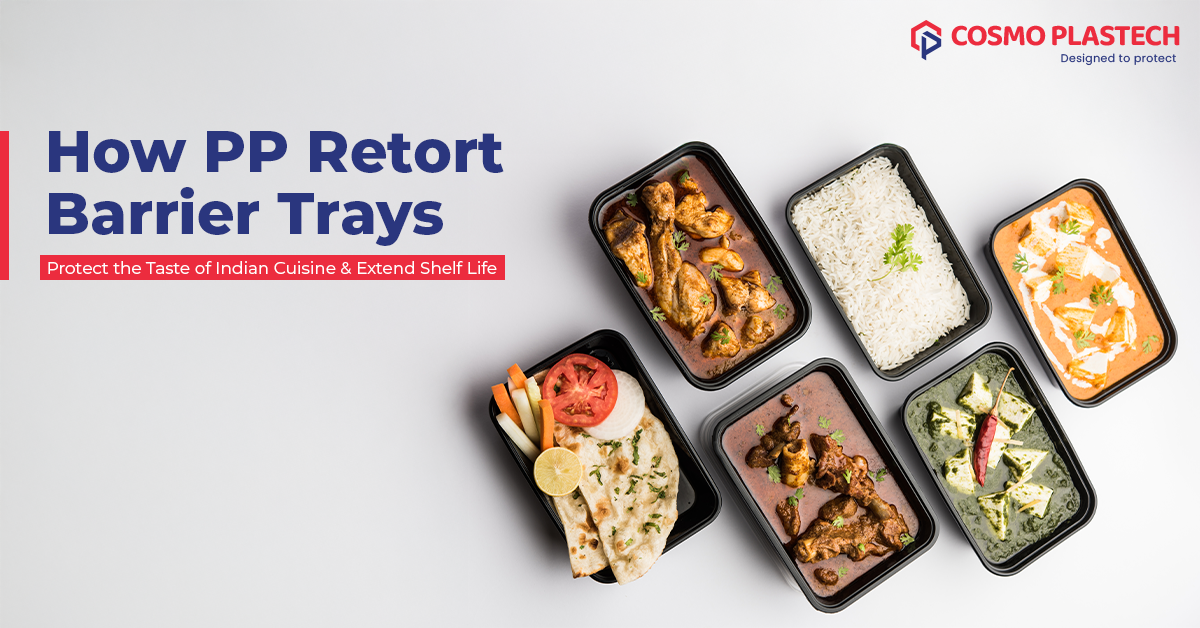Love to hear from you!
Get in touch.

Indian cuisine, renowned for its rich flavors, aromatic spices, and intricate cooking techniques, has captivated palates worldwide. Whether its butter chicken simmered in creamy tomato sauce or a fiery dish packed with chili and vinegar, every dish represents centuries of culinary tradition.
However, preserving the taste, texture, and aroma of such complex dishes for long-distance export remains a significant challenge. This is where PP retort barrier trays have revolutionized the packaging and distribution of ready-to-eat Indian meals.
The Challenge of Preserving Indian Cuisine
Unlike many dishes that may tolerate freezing or drying without significant quality loss, Indian cuisine relies heavily on:
Traditional preservation methods like freezing or dehydration often degrade flavor and texture. Frozen food packaging requires a cold chain for storage and transport, which is both costly and infrastructure-intensive, especially for global markets.
To meet the growing demand for authentic Indian meals globally - while maintaining flavor integrity and safety, food manufacturers require packaging solution that extends shelf life without compromising taste.
PP Retort Barrier Trays
Retort packaging involves sealing food in airtight containers and subjecting them to high-temperature processing to sterilize the contents.
PP retort barrier trays are made from polypropylene with added barrier layers to prevent the transmission of oxygen, moisture, and other gases that can degrade food quality over time. Here's how these trays make a difference:
1. Preserve Taste & Aroma
The flavors in Indian food depend on volatile aromatic compounds found in spices like cumin, coriander, cloves, and cardamom. These can easily degrade or dissipate during improper packaging or storage. PP barrier trays include high-barrier layers that prevent oxygen ingress and aroma egress, ensuring:
The result? Indian meals taste almost as good as when they were first cooked, even after months on the shelf.
2. Shelf Life Extension
Through the retort process, PP trays allow meals to be shelf-stabl, opening the door for:
Longer shelf life also reduces food waste, an increasingly important concern in global food logistics.
3. Safety & Hygiene
PP retort trays are thermally stable and chemically inert, meaning they don't leach harmful substances when subjected to high temperatures. They are also resistant to warping or distortion during the retort process, ensuring a consistent seal and safe product.
This is particularly important for Indian gravies and curries, which often contain acidic components like tomatoes and tamarind that can react with low-quality packaging.
4. Microwave & Convenience Friendly
For global consumers, convenience is key. PP trays are:
Microwaveable, allowing meals to be heated and eaten directly from the tray.
Lightweight and stackable, reducing transportation costs.
Tamper-evident, giving consumers peace of mind.
5. Eco-Conscious Innovation
Modern PP retort trays are increasingly being designed with recyclability and sustainability in mind. Many manufacturers are working with:
Mono-material designs for easier recycling
Bio-based PP derived from renewable resources
Lightweighting techniques to reduce plastic use without compromising barrier properties
These innovations help meet the growing demand for environmentally responsible packaging without sacrificing performance.
PP retort barrier trays represent a powerful fusion of food science, material engineering, and culinary heritage. They are more than just containers, they're flavor vaults that protect the soul of Indian cuisine while enabling its expansion across continents.
Looking to package your Indian ready meals for global markets? Connect with us for reliable solutions.
Featured Post
Love to hear from you!
Get in touch.